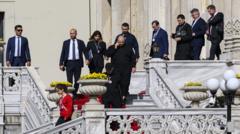Amid ongoing conflict, Russia and Ukraine's latest talks result in only a prisoner swap agreement, highlighting their deepening divide on ending the war.**
Renewed Peace Talks Yield Little Progress as Russia and Ukraine Focus on POW Exchange**

Renewed Peace Talks Yield Little Progress as Russia and Ukraine Focus on POW Exchange**
Diplomatic discussions in Istanbul conclude with no ceasefire agreement but a commitment to return prisoners of war.**
The second round of direct peace negotiations between Russia and Ukraine ended once again without significant advancements, culminating in an agreement for a prisoner exchange rather than a ceasefire. Ukrainian representatives announced that Russia had rejected their demand for an "unconditional ceasefire," which is a pivotal condition for Ukraine and its allies in the West. In contrast, Russia’s delegation suggested a temporary ceasefire in select regions along the extensive front line but did not elaborate further.
The talks, which took place in Istanbul and lasted approximately one hour, did, however, reach an agreement to return the remains of 12,000 soldiers. Ukrainian Defence Minister Rustem Umerov emphasized the need for a comprehensive ceasefire lasting at least 30 days on land, sea, and air to halt the ongoing violence. He expressed frustration that Russia had not reciprocated by presenting their truce proposals until this latest round of discussions.
Ukrainian President Volodymyr Zelensky criticized Russia's proposal for a brief ceasefire solely for collecting bodies, stating, "the whole point of a ceasefire is to stop people from becoming dead." Specific details regarding both parties' ceasefire proposals have not been officially released, although media outlets in Russia shared elements of their stance afterward. This includes their demands for Ukraine to withdraw from contested regions and international recognition of territories, including Crimea, which was illegally annexed in 2014.
Ukrainian officials fear Russia's rejection of an unconditional ceasefire is indicative of their stalling strategy to gain further ground in Ukraine. Both sides also confirmed the intention to exchange sick and critically injured prisoners of war as well as those under the age of 25, though timelines for these exchanges remain unclear.
While the Ukrainian leadership continues to push for support against Russian aggression, U.S. President Donald Trump, advocating for rapid negotiations, has been slow to impose harsher sanctions on Moscow. Nonetheless, Trump expressed his willingness to convene a meeting with Zelensky and Russian President Vladimir Putin if needed, amidst rising calls for unity against the continued conflict. Despite the stalled peace efforts, Zelensky maintains that enhancing Ukraine’s defense capabilities is crucial in light of Russia’s unyielding conditions.
The talks, which took place in Istanbul and lasted approximately one hour, did, however, reach an agreement to return the remains of 12,000 soldiers. Ukrainian Defence Minister Rustem Umerov emphasized the need for a comprehensive ceasefire lasting at least 30 days on land, sea, and air to halt the ongoing violence. He expressed frustration that Russia had not reciprocated by presenting their truce proposals until this latest round of discussions.
Ukrainian President Volodymyr Zelensky criticized Russia's proposal for a brief ceasefire solely for collecting bodies, stating, "the whole point of a ceasefire is to stop people from becoming dead." Specific details regarding both parties' ceasefire proposals have not been officially released, although media outlets in Russia shared elements of their stance afterward. This includes their demands for Ukraine to withdraw from contested regions and international recognition of territories, including Crimea, which was illegally annexed in 2014.
Ukrainian officials fear Russia's rejection of an unconditional ceasefire is indicative of their stalling strategy to gain further ground in Ukraine. Both sides also confirmed the intention to exchange sick and critically injured prisoners of war as well as those under the age of 25, though timelines for these exchanges remain unclear.
While the Ukrainian leadership continues to push for support against Russian aggression, U.S. President Donald Trump, advocating for rapid negotiations, has been slow to impose harsher sanctions on Moscow. Nonetheless, Trump expressed his willingness to convene a meeting with Zelensky and Russian President Vladimir Putin if needed, amidst rising calls for unity against the continued conflict. Despite the stalled peace efforts, Zelensky maintains that enhancing Ukraine’s defense capabilities is crucial in light of Russia’s unyielding conditions.


















